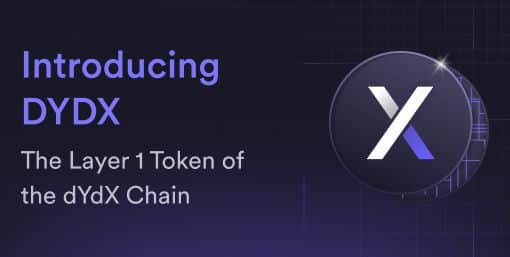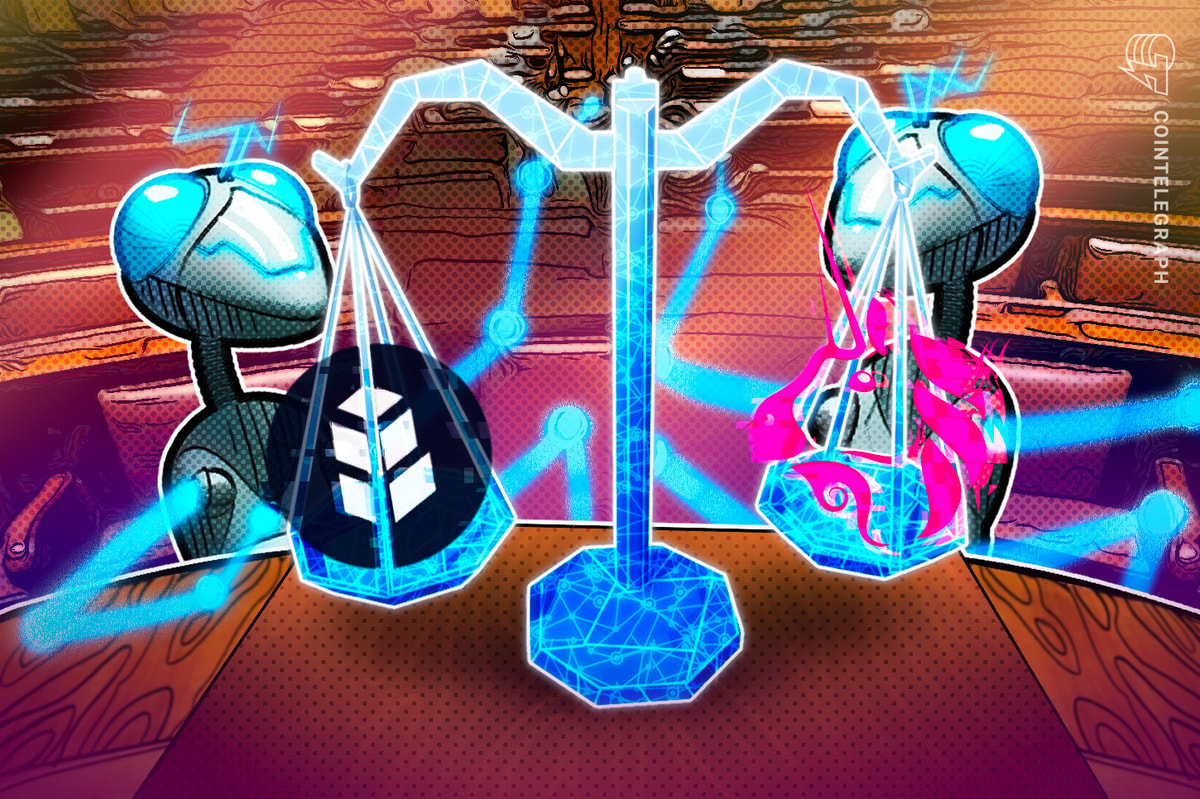October 30, 2023


In Brief
On October 26, the first block of the dYdX Chain mainnet was created (“Genesis”) by the dYdX Chain Validators.

The dYdX Foundation announced that, on October 26 at 17:00 UTC, the first block of the dYdX Chain mainnet was created (“Genesis”) by the dYdX Chain Validators. The creation of the first block of the dYdX Chain and the adoption of DYDX as the Layer 1 token of the network lead to new utility for the DYDX token on the dYdX Chain. Below you’ll find some details and highlights about the role of DYDX within the dYdX Chain, how the token has evolved and how protocol fees are distributed to Validators and Stakers on the dYdX Chain.
The dYdX Chain is a proof-of-stake blockchain network built using the Cosmos SDK and leveraging CometBFT for consensus. The dYdX Chain requires a Layer 1 protocol token that can be staked to Validators to secure the chain and to assist with governance of the network.
On the dYdX Chain, all fees (trading fees denominated in USDC and gas fees for DYDX-denominated transactions or USDC-denominated transactions) collected by the protocol are distributed to Validators and Stakers.
The current DYDX token (herein “ethDYDX”) has been the governance token of the dYdX Layer 2 protocol on Ethereum (“dYdX v3”) since it was released on August 3, 2021. Recently, the dYdX community voted to adopt DYDX as the L1 token of the dYdX Chain, adopt a one-way bridge from Ethereum to the dYdX Chain and to give wrapped Ethereum DYDX (“wethDYDX”) the same governance utility as ethDYDX in dYdX v3.
Expanded utility of DYDX on the dYdX Chain
Based on dYdX community decisions through dYdX governance, the utility of the DYDX token has expanded: DYDX may now be used for staking, securing the network, and assisting with governance on the dYdX Chain.
Staking
In any proof-of-stake (PoS) blockchain network, the role of Stakers is pivotal in shaping the security and strength of the network, and the dYdX Chain is no exception. On the dYdX Chain, DYDX holders have the option to serve as Validators or to delegate their stake to existing Validators. Staking secures and protects the network and enables the Staker to receive dYdX Chain protocol fees in proportion to their stake weight.
All fees (trading fees denominated in USDC and gas fees for DYDX-denominated transactions) collected by the dYdX Chain protocol are distributed to Validators and Stakers. The distribution of protocol fees on the dYdX Chain is facilitated through the Cosmos x/distribution module.
Security
Proof-of-Stake blockchains gain their security by assigning the verification and confirmation of transactions to one of their main stakeholder groups: Validators. With significant economic value at stake, Validators are incentivized to maintain the integrity of the ledger, lest they suffer substantial losses. Staking DYDX directly contributes to dYdX Chain security; as more DYDX holders choose to stake their tokens across a diverse range of Validators in the network, and the total amount of stake on the network increases, it becomes increasingly difficult for a coordinated attack to influence a consensus decision.
Simply put, the more native DYDX tokens that are staked or “bonded” to dYdX Chain Validators and the more distributed the stake across multiple Validators, the more secure and resilient the network becomes.
Governance
The dYdX Chain leverages the standard x/gov module within the Cosmos SDK. As such, we anticipate that governance on the dYdX Chain will be more accessible than dYdX v3 governance.
For example:
- Many of the modules in the dYdX Chain open source software have parameters that are controlled by dYdX Chain governance.
- The dYdX Chain does not have the dYdX v3 concept of ‘Proposing Power’; instead, the governance module effectively enables any holder to create a governance proposal with a deposit. However, the governance module leverages the MinDeposit threshold and the NoWithVeto vote option to control for spam proposals.
Please note:
- Only staked DYDX tokens will be able to be used in dYdX Chain governance.
- dYdX Chain Validators inherit the voting weight of their Stakers, unless a Staker decides to vote on a proposal themselves.
More details on the evolution of DYDX from a governance token in dYdX v3 to the L1 token of the dYdX Chain can be found in this blog post.
Disclaimer
Any data, text, or other content on this page is provided as general market information and not as investment advice. Past performance is not necessarily an indicator of future results.
![]()
![]()
The Trust Project is a worldwide group of news organizations working to establish transparency standards.
Victor is a Managing Tech Editor/Writer at Metaverse Post and covers artificial intelligence, crypto, data science, metaverse and cybersecurity within the enterprise realm. He boasts half a decade of media and AI experience working at well-known media outlets such as VentureBeat, DatatechVibe and Analytics India Magazine. Being a Media Mentor at prestigious universities including the Oxford and USC and with a Master’s degree in data science and analytics, Victor is deeply committed to staying abreast of emerging trends.
He offers readers the latest and most insightful narratives from the Tech and Web3 landscape.

Victor Dey

Victor is a Managing Tech Editor/Writer at Metaverse Post and covers artificial intelligence, crypto, data science, metaverse and cybersecurity within the enterprise realm. He boasts half a decade of media and AI experience working at well-known media outlets such as VentureBeat, DatatechVibe and Analytics India Magazine. Being a Media Mentor at prestigious universities including the Oxford and USC and with a Master’s degree in data science and analytics, Victor is deeply committed to staying abreast of emerging trends.
He offers readers the latest and most insightful narratives from the Tech and Web3 landscape.
Read More: mpost.io









 Bitcoin
Bitcoin  Ethereum
Ethereum  Tether
Tether  XRP
XRP  Solana
Solana  USDC
USDC  Dogecoin
Dogecoin  Cardano
Cardano  TRON
TRON  Lido Staked Ether
Lido Staked Ether  Wrapped Bitcoin
Wrapped Bitcoin  Sui
Sui  Wrapped stETH
Wrapped stETH  Chainlink
Chainlink  Avalanche
Avalanche  Stellar
Stellar  Hyperliquid
Hyperliquid  Shiba Inu
Shiba Inu  Hedera
Hedera  LEO Token
LEO Token  Bitcoin Cash
Bitcoin Cash  Toncoin
Toncoin  Litecoin
Litecoin  Polkadot
Polkadot  USDS
USDS  WETH
WETH  Monero
Monero  Bitget Token
Bitget Token  Wrapped eETH
Wrapped eETH  Binance Bridged USDT (BNB Smart Chain)
Binance Bridged USDT (BNB Smart Chain)  Pepe
Pepe  Pi Network
Pi Network  Ethena USDe
Ethena USDe  Coinbase Wrapped BTC
Coinbase Wrapped BTC  WhiteBIT Coin
WhiteBIT Coin  Aave
Aave  Dai
Dai  Bittensor
Bittensor  Uniswap
Uniswap  NEAR Protocol
NEAR Protocol  Aptos
Aptos  OKB
OKB  Jito Staked SOL
Jito Staked SOL  Ondo
Ondo  BlackRock USD Institutional Digital Liquidity Fund
BlackRock USD Institutional Digital Liquidity Fund  Cronos
Cronos  Tokenize Xchange
Tokenize Xchange  Internet Computer
Internet Computer